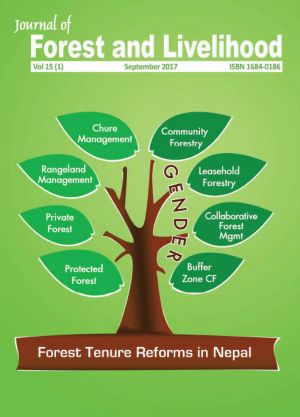Feminist Institutionalist Interpretation of Forest Tenure Regimes in Nepal
DOI:
https://doi.org/10.3126/jfl.v15i1.23095Keywords:
Feminist institutionalism, forest tenure, formal institution, informal institution, tenure regimeAbstract
Forest tenure reform is one of the key agenda for sustainable forest governance. But forest tenure is not gender neutral. We examine various forest tenure regimes of Nepal from feminist institutionalist approach and explore, to what extent, each regime recognises the right of women to forest tenure. Five community-based forest tenure regimes, namely community forest, pro-poor leasehold forest, collaborative forest, buffer zone community forest and conservation area are taken into account for assessing gender dimension. Historical changes and continuity are presented in forestry governance in terms of women’s bundle of rights over forest resources across three key phases – before 1950s, from 1950s to 1970s and from 1970s onward. Formal and informal institutions in each of the five tenure regimes were analysed and we found that the formal institutions in community forestry recognises the roles of the women in forest tenure, but those in other regimes and informal rules in all the regimes, by and large, prevent women from having access to and control over forest resource decisions. Emerging aspects of forestry, mainly forest-based enterprises and REDD+ have not been able to address gender issues properly. Some recommendations are made for gender equality in forest tenure regimes.
Downloads
Downloads
Published
How to Cite
Issue
Section
License
CC-BY-NC: This license allows reusers to distribute, remix, adapt, and build upon the material in any medium or format for noncommercial purposes only, and only so long as attribution is given to the creator.





